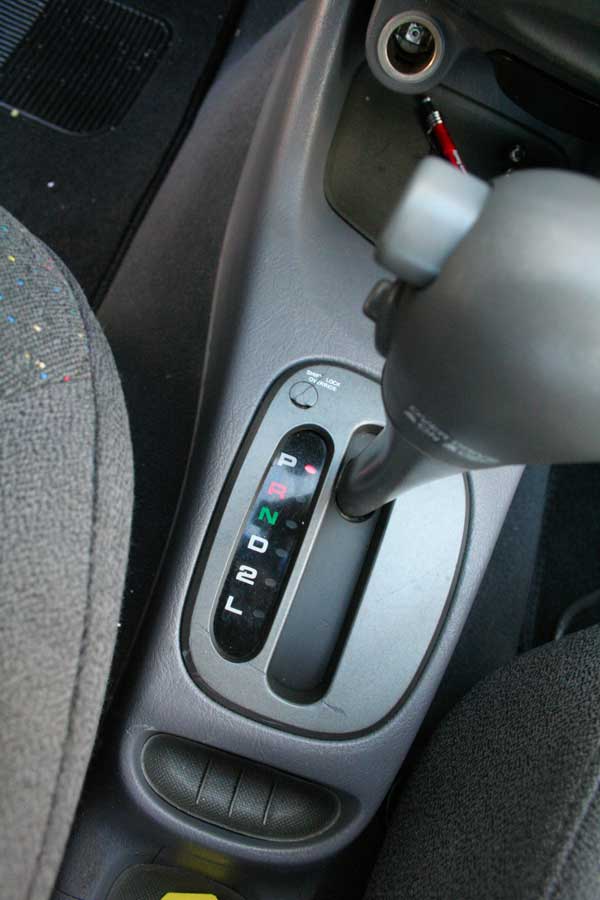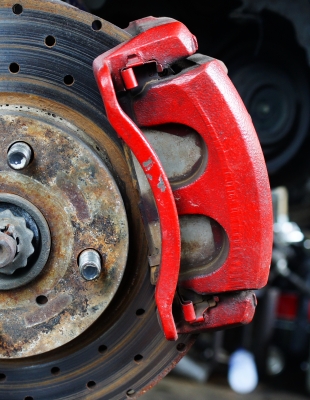Subaru automatic shifter solenoid question.
 Question: I have a 92 Subaru loyale and the solenoid in the shifting mechanism isn’t receiving any power. My question is what powers the solenoid, is it the inhibitor relay or inhibitor switch that isn’t giving it power? I hooked the solenoid up to a voltage meter and there is absolutely no power, so the shifter is stuck in park and won’t switch gears unless I use the emergency release button. So my husband decided to bypass the solenoid completely and hook up the shifter to a light so the shifter will shift into other gears. But what is causing the no power to the solenoid?
Question: I have a 92 Subaru loyale and the solenoid in the shifting mechanism isn’t receiving any power. My question is what powers the solenoid, is it the inhibitor relay or inhibitor switch that isn’t giving it power? I hooked the solenoid up to a voltage meter and there is absolutely no power, so the shifter is stuck in park and won’t switch gears unless I use the emergency release button. So my husband decided to bypass the solenoid completely and hook up the shifter to a light so the shifter will shift into other gears. But what is causing the no power to the solenoid?
Thanks,
Beth
Answer: Beth, the shifter solenoid is designed to keep you from shifting out of park when the brake pedal is not depressed. There should be a plunger switch under the dash directly above the brake pedal which activates your brake lights, and sends a signal to the solenoid to activate and allow shifting when the pedal is depressed.
I would first check to see if your brake lights work, if not then the switch is bad, a common issue on older cars. The replacement part is usually under $10 and easy to change.
If you have brake lights, then you need to check voltage at the relay when the car is on and the brake pedal is depressed. If you don’t have voltage (12 volts) follow the wiring from that brake light switch to the shifter solenoid and see if there is a break in the wiring, or a blown fuse. If you do have voltage coming in to the solenoid when the brake pedal is pressed, then the solenoid is likely bad.
Posted: 8th October 2014 | Author: Kevin Schappell | Category: Brakes, Drivetrain, Electrical
Brake Service, What You Need To Know
 As a car owner, getting your brakes serviced is a part of ownership, but do you know if you are getting the best service? Let’s start with common reasons you may find yourself at a mechanic for brake service…
As a car owner, getting your brakes serviced is a part of ownership, but do you know if you are getting the best service? Let’s start with common reasons you may find yourself at a mechanic for brake service…
Brake Noises:
Most issues with brakes start with a noise. Most brake pads are designed to make noise when they come close to the end of their useful life. They have a thin metal warning tab which vibrates when it touches the brake rotor. This is entirely normal and serves as a signal to you the driver to get them serviced soon.
Brake dust build-up can also cause squeaking but it’s usually intermittent. If your brake pads have been changed lately and the squeaking has started, I would suspect brake dust.
Grinding Noises:
Grinding noises are usually the brake pad backing material grinding in to the rotor. Brake pads are made of a steel backing plate with friction material being bonded or riveted to it. As the friction material wears away the rivets or the actual backing plate can contact the rotor. Any grinding noise should be cause for an immediate trip to the mechanic.
The Shakes:
You step on the brakes and you are met with a shimmy and a shake from the steering wheel, what to do? The brake rotor can warp over time, and can cause the front wheels to shake slightly. While a minor shake is ok, and can come and go, if it’s too much poor steering and stopping distances can result. Most brake rotors today are made thin enough, that the rotor cannot be turned, or resurfaced, so replacement is usually the way to go.
Now that you have the basics down, how about getting the best deal on a brake job?
Where to go for brake service?
If your car is under warranty and you have a good relationship with them, by all means go there. Independent garages are a good option if you can find a good one you trust, as the costs will be slightly lower. Franchise brake and oil change shops should be your last resort. I always recommend asking friends for recommendations, and of course check online for reviews.
Pad Choices?
Brake pads are all about the friction material, the harder they are, the longer they last. But with anything in life, there is a tradeoff. Harder brake pads will wear down the rotor faster and may produce more heat making warping a possibility. Most places will advertise lifetime brake jobs, and install hard metallic pads to prolong the life at the expense of your rotors. I recommend going with a name brand organic brake pad or a semi-metallic. You may end up changing brake pads more, but will have to replace rotors less frequently as well.
What to look for in a brake job?
Always insist on an estimate before work is done, ask to see the worn parts before any work is done and if you are not able to see the parts, ask that they save them for you to view when picking up your car. Never be afraid to ask questions, a good shop appreciates an educated customer. Also ask that your wheels be torqued with a torque wrench and not an impact wrench and “torque sticks” which may or may not provide uniform torque if not used correctly. Uneven torque can lead to warped rotors which will just have you back at the shop spending more money.
Posted: 9th April 2014 | Author: Kevin Schappell | Category: Brakes
Ford Explorer Warped Rotors
Question: I have an 03 Ford Expedition and I have been experiencing pulsating in the steering wheel, I have turned the front rotors twice and in no time they are back the same way. So, I replaced both the front rotors and calibers, and its still not right. When I was bleeding the whole brake system, I noticed that the rear did not bleed like the front did, the pedal did not go all the way down. My question is what determines the amount of pressure that goes to the front verses the rear? I think that my problem is that the rear brakes are not being applied enough, thus causing the front to work harder and get hotter than normal, causing them to warp easier.
Answer:
There is a proportioning valve ( or sometimes called a modulator valve
) which in modern vehicles is usually combined with the ABS functions.
It should be located immediately after the master cylinder and is
usually an aluminum block. Your brake system should apply more
pressure to the front brakes, which is where most of the braking
occurs. You can test function of the proportioning valve by doing a
low speed panic test and see if the front or rear brakes lock up
first. Do it in an empty parking lot and have someone watch from a
distance to see which wheels lock up. With ABS, it wont be easy to
see. I would say 20 – 30mph would be all the faster you would want to
go. Again, be careful, make sure the parking lot is empty.
When you replaced your rotors, did you tighten the lug nuts with a
torque wrench? Improper torquing of the lug nuts can cause rotor
warpage over time.
Posted: 18th October 2009 | Author: Kevin Schappell | Category: Brakes
Brake Bleeding Problems or Master Cylinder?
Question:
I own a 96 Chevy Cavalier and the breaks are bad, the pads are still good, we removed the air from the line, and it has great vacuum what else could be wrong?
Answer:
The master cylinder could be bad. How did you remove the air from the lines? With modern ABS systems, its usually best to use a pressurized or vacuum bleeder to make sure all the air is out. The old crack the bleeder and have a buddy push the pedal does not work as well as it used to. I would take it to a shop that has the proper bleeding equipment and have them get all the air out, if its still bad, then its more than likely the master cylinder.
Posted: 7th July 2009 | Author: Kevin Schappell | Category: Brakes
Audi Brake Job
Question:
Hey Kevin,
I have a 2001 Audi A4 Quattro and I recently changed the rear pads. I bought Wagner brake pads which where the more expensive of the choices and now have a persistent squealing noise from the right rear pads. which occurs while driving and goes away when I brake and comes right back when I let off the brakes. I tried to sand the calipers and applied never seize and special spray lube but nothing seemed to work. Any suggestions would be great.
Answer:
When you changed the pads, did you screw in the caliper pistons, or just use a clamp to push the piston back in? On the Audis the piston must be screwed back into the caliper. Its possible there is not enough room for the pads to back off the rotor, it may be rubbing while the brakes are not applied. Also I dont know what you sanded on the caliper, but you may have damaged the caliper depending on how much and where you sanded it down. As with any brake job, cleaning the calipers and rotors is critical to no squeaks and should only be done with a spray on brake cleaner. ( no abrasives !)
Posted: 7th July 2009 | Author: Kevin Schappell | Category: Brakes
